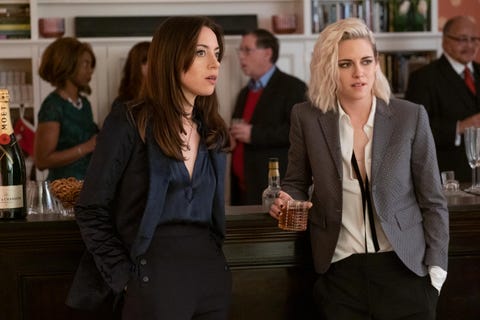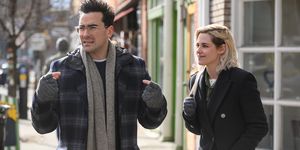It’s been more than a week since Hulu released Happiest Season, and queer TikTok and Twitter are alive with take after take about this film. I knew when I first
watched that the tidal wave of analysis was coming, but I wasn't quite prepared for what hit my groups chats: takedowns of Harper (Mackenzie Davis), thirst-monologues about Riley (Aubrey Plaza), ruminations on the toxicity of that coming-out scene, anger over such an emotionally rough movie being marketed during the holidays, and…more Aubrey Plaza thirst.
Look. I get it. It’s exhausting to haul around your own queer emotional trauma, and it’s really hard to see someone else’s play out in a mainstream movie. Clea DuVall and Mary Holland, who co-wrote the film (DuVall also directed and Holland plays Harper’s sister Jane), told me during a recent Zoom call that they understand this movie doesn't gloss over the hard stuff in order to bring fluffy, gay holiday cheer.
And for all its emotional turmoil, Happiest Season does have a happy ending for Abby (Kristen Stewart), though many people joining in the discourse wish it would’ve been with Riley, not Harper. Below, I talk to DuVall and Holland about the disdain folks have for Harper, why the film doesn’t hold back from depicting trauma, and that processing scene.
Why did you want to make a rom-com specifically for queer people?
Clea DuVall: I am a huge fan of holiday movies and rom-coms, but I’d never really seen my experience represented. I know my experience is not singular, so there were probably a lot of other people feeling the same way I did. It felt like a great idea to tell a universal story from a new perspective.
I loved the the little jokes that felt like a nod to queer culture, like the moment Abby and Harper pull over to the side of the road to process the fact that Harper lied to Abby about coming out, or the moment Harper texts Abby with a period at the end of a sentence. Yu can feel Abby analyzing that to death. What were the conversations around including these little references that maybe only queer people would get?
CD: We really led with character and story. It felt so organic to these characters. The things that were really important to me were to show the friendship between Abby and John and Abby and Riley. As someone working in Hollywood, there are so many times where I’m the only queer person on set, and in the rare instance where there is another queer person, particularly if there’s another queer woman, we are like magnets. We speak the same language. There’s an instant connection and familiarity that develops quickly. The relationships I have with my friends who are queer women are so important to me. I feel like there are so few queer characters in movies that if there are two queer women in a movie, they have to be together because there’s no one else. Really being able to showcase intimacy between two women that doesn’t need to be romantic was something I don’t see a lot in film and something I felt was important to put in there.
Why was it important to make that chosen family stand out?
CD: Because that is something so beautiful about our community. That’s something we all share. It’s that chosen family that helps us survive. For me, I don’t have a traditional family; I only have a chosen family, and they have saved my life—for my entire life—in countless ways. I think really showcasing that and showing the importance of that was something any queer person would be able to see and relate to.
MH: It has become so clear to me how important it is for people to find a family and community that accepts them for who they are, and if that’s not their traditional family, it’s showing the beauty and love that can be gained from a chosen family. It is such a beautiful thing and it should be celebrated. We should see so many stories that feature chosen family.
I love Jane, by the way. That’s another great storyline about how she needs to find a place, too. I love how she finds her little tribe of nerds when she gets her book published at the end.
MH: It was so satisfying to have her family take a moment when she sort of snaps. They realize there is this wonderful, talented person in their family that they’ve been overlooking. It was wonderful to see them supporting her at that reading and for her to be surrounded by this community of fantasy nerds.
I don’t know if either of you know this, but queer and lesbian Twitter and TikTok is really, really bummed that Riley and Abby don’t end up together. What is your response to people who are upset about the ending or wish it had ended differently?
CD: I think it’s great that people are having so many debates about it. People are invested. No matter how they feel about it, they’re invested in the film, which is huge, and I appreciate that people have taken the time to watch the movie and continue to process it—that’s really great. I get it. Aubrey Plaza is amazing. She’s such a babe. I don’t blame anyone for wanting to see more of her, but I think the debate is less about the film and more about your philosophy on forgiveness and growth.
Speaking as a very, very happily married person, my partner and I have been together for eight years, and we have gone through some shit. You face obstacles, and you work through them, because everybody comes to a relationship with baggage, right? You meet someone, and you’re like, Here’s my suitcase, here's my suitcase, let’s open ’em up! You start to unpack it, and you’re like, Yeah, I can deal with that. I think as long as you’re processing and dealing with things in an open, honest way and making the conscious choice to work through them, then the road to a happy, healthy relationship is bumpy, and you work through stuff, and that’s what makes it stronger. You don’t go through a hard couple of days after a long period of time, meet a stranger, and cut and run. Even if that person is Aubrey Plaza.
MH: And listen, it’s tempting.
CD: Hey, I can’t blame anyone.

I wonder if people are so used to the kind of smoothed-over, Hallmark-y rom-com where the characters don’t bring their real baggage. People have referenced Harper’s behavior as triggering to things they’ve experienced in past queer relationships. Why do you think this character brought up such a strong response in the audience?
CD: I think because it is so relatable, and it is very real. We don’t shy away from the reality of that experience. We’re watching a person go through the most difficult four days of their life. We’re watching someone hit bottom, and that is messy, that is uncomfortable. But I think what we really wanted for the film and for Harper was, she didn’t sink further down [when] she hit bottom. She used that as an opportunity to propel herself back up and make a different choice. Yes, she messed up, but it shocks her out of that cycle and into a new realm where she recognizes she hasn’t been her best self, and it inspires her to become that person.
Imagining what happens after the movie ends, or between the end and the one year later, I imagine Abby and Harper go home and do a lot of processing. They work through it, because it’s not like they go home and get engaged the next week. It’s ten months later. They are doing the work together and making that conscious choice of, Okay, yes, we do want to move forward. Yes, this was not great, but we do believe in each other and we believe in our relationship, and it’s worth working on.
MH: Watching this story play out, and people who have experienced something similar, it feels like something to be celebrated, that this story is being represented on such a huge scale in this big, mainstream movie. We do deal with very real things, and we don’t shy away from the reality of that experience, but we give them a happy ending. That was really important to us.
What do you think that conversation was like on the drive home from Harper’s family Christmas?
[Both laugh]
MH: Abby was probably like, "Well, we have a lot to talk about!"
CD: I imagine before they even went back to the house [from the gas station], they debated: “Do we want to go home or do we want to go back to the house?” And they made that choice to go back and be with Harper’s family. Then, they get in the bedroom, talk about it, what does this mean, setting the ground rules: "We need to talk about this, we need to work on it." There’s a lot of processing. I think it probably went on for months, and they went to couples therapy together, and Harper realized what she did in a very real way and was not afraid to do the work. At a certain point, we all have to do the work. I did, and at the end of the journey, I am now in a relationship where I’m happier than I’ve ever been, but I had to fight a lot of my own shit to get here. But thank God I did. And thank God I did with this person, ‘cause she’s incredible. She makes me so happy.

Another discourse around this film has been, 'It’d be great to have a queer story that's not about coming out. They’re just queer and living their lives.' I’m of the opinion that we still need coming-out stories, but I want to know why you think that.
CD: To think that coming out stories are not relevant is a very privileged perspective. If you live in New York or Los Angeles or within a very progressive bubble, it’s very easy to look at it and be like, We’re past that. But for the majority of queer people? They’re not. This is the first LGBTQ story told on this scale. I think because it is very mainstream and it’s appealing to so many people, it’s like starting at the beginning. To get to this place where we're seeing LGBTQ stories on a mainstream level, with regularity, is starting at a place where it’s being generous with an audience who might not be aware of this experience. Also, to humanize and help [the audience] understand the process and what one version of it is like. There are so many stories, and they all deserve to be told. This is just one. I really believe we need to see coming-out stories, and we need to see happy endings and not bittersweet endings. I feel like we are always given, particularly with lesbian stories, bittersweet endings. The last happy ending I can think of is But I’m a Cheerleader. That was 20 years ago!
This interview has been edited and condensed for clarity.



